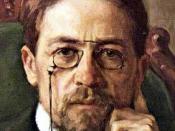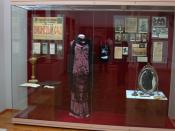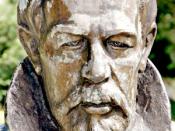Anton Chekhov was so bored by Ibsen's 'The Wild Duck' he remarked that "Ibsen does not know life" and that "Ibsen is no dramatist"
It might be argued that Chekhov felt Ibsen to be in some ways, as a thinker, too like himself.
Ibsen and Chekhov share a number of beliefs: individualism, sincerity, the loathsomeness of tyranny, freedom for women. Tolstoy even condemned the seagull for being like Ibsen: "mere verbiage - leading nowhere".
But Chekhov employs a different technique to Ibsen to produce a sense of reality in 'The Cherry Orchard".
The orchard, the obvious focal piece of the play, is to be sold a month after Madame Ravensky's arrival. Lopakhin believes that the only way the orchard estate can be saved is by chopping down the cherry trees and breaking up the property, which he intends to do if he buys the orchard. Madame Ravensky would rather the orchard be lost completely than changed from how it will remain in her memories forever.
The play is generated on seminal values of this family. No one in the family wants to see the cherry orchard go but it is ludicrous that the family does not see that the cherry orchard is going either by sale or development. Since this is a fact, it is only reasonable that the family should profit from the lost of the cherry orchard. The importance of seminal values should be over run by the importance of survival. Ranyevskaya does not seem to be concerned with survival and can only see the cherry orchard as a seminal object. This is completely ridiculous and demonstrates the comical actions of Ranyevskaya. The view of the cherry orchard as a seminal object also effects the true objective of the cherry orchard. Firs say: "In the old...


